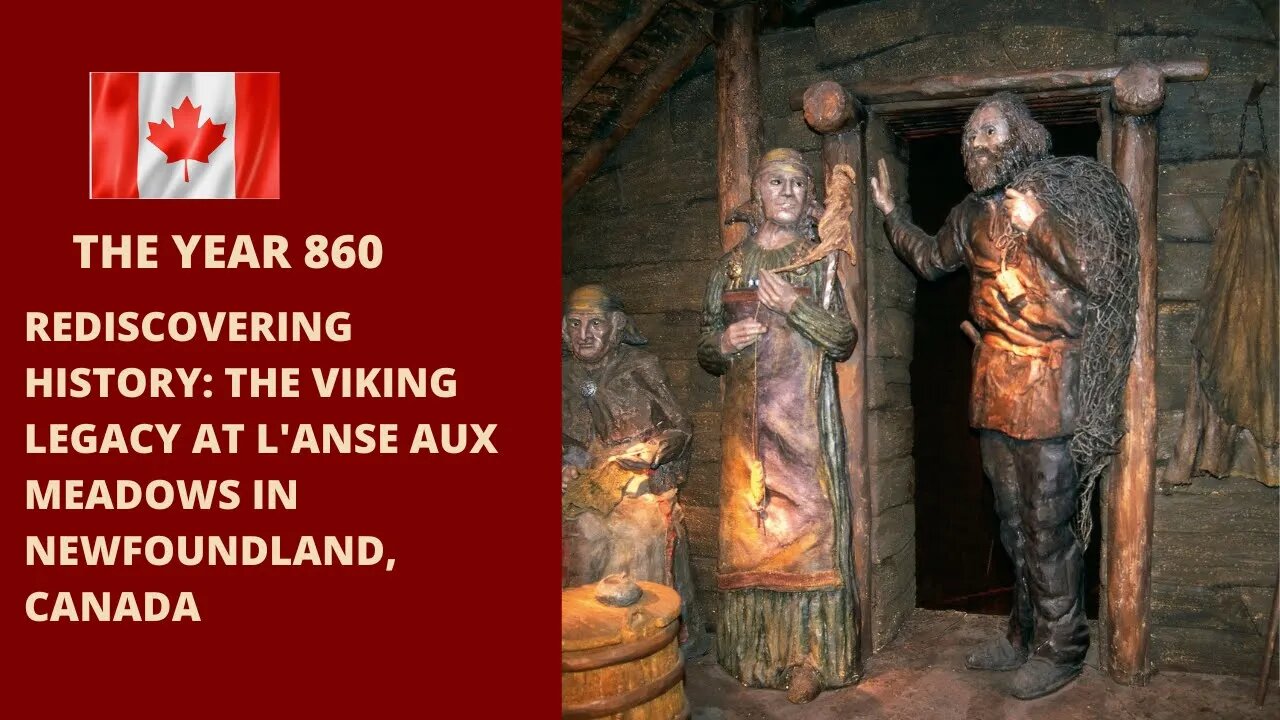Premium Only Content

Rediscovering History: The Viking Legacy at L'Anse aux Meadows in Newfoundland, Canada
Rediscovering History: The Viking Legacy at L'Anse aux Meadows in Newfoundland, Canada
#VikingLegacy,#LAnseAuxMeadows,#NorthAmericanExploration,#RediscoveringHistory,#VikingSettlement,#ArchaeologicalFind,#CulturalHeritage,#AncientCivilizations,#VikingHistory,#TransatlanticVoyages,#VikingExplorers,#NorseSettlement,#HistoricalSignificance,#UncoveringthePast,#Interconnectedness,#CulturalDiversity,#PreservingHistory,#HistoricSite,#ExploreNewfoundland,#CanadianHistory,#DiscoverCanada,#VikingCulture,#AncientExplorers,#NorseLegacy,#VikingArchaeology,#VikingWayofLife,#HeritagePreservation,#WorldHeritageSite,#Unesco,#VikingAdventure
The sagas of the fierce Norse seafarers, known as Vikings, have captivated our imagination for centuries. These intrepid explorers are renowned for their daring voyages across the North Atlantic, but their presence in North America remained shrouded in mystery until recent archaeological discoveries. Located in Newfoundland, Canada, L'Anse aux Meadows stands as a testament to the first Viking settlement in North America, unraveling a fascinating chapter in history and transforming our understanding of early transatlantic exploration.
History is a broad term that refers to the study and interpretation of past events and their significance to the present day. It encompasses the actions, beliefs, and experiences of human beings throughout time, as well as the physical artifacts and records that document these events. The study of history helps us to understand how the world we live in today has been shaped by past events and how we can learn from them.
The importance of history cannot be overstated. By examining past events, we can learn from the successes and failures of those who came before us, and apply this knowledge to our own lives and society. It helps us to understand the roots of current political, economic, social, and cultural issues and how they have evolved over time. History can also help us to appreciate the diversity of human experience and the many ways in which people have interacted with one another throughout history.
One of the key methods used in the study of history is the interpretation of primary sources. These can include written records, such as letters, diaries, and official documents, as well as physical artifacts like artwork, tools, and architecture. By examining these sources and analyzing them in context, historians can gain insights into the beliefs, values, and motivations of past peoples and societies. This can help us to understand the complexities of human behavior and decision-making, as well as the impact of larger social, economic, and political forces.
Another important aspect of the study of history is the consideration of multiple perspectives. This involves taking into account the viewpoints of different groups of people, such as women, minorities, and those who have been historically marginalized or excluded from mainstream narratives. By doing so, historians can gain a more complete picture of past events and the ways in which they have affected different communities.
In addition to its academic importance, history also plays a crucial role in shaping our collective memory and identity as a society. By remembering and commemorating important events and figures from the past, we can create a shared sense of history and belonging. This can help us to build stronger communities and foster greater empathy and understanding between different groups of people.
Overall, the study of history is essential for understanding ourselves, our world, and our place in it. Through careful analysis of past events and sources, we can gain insights into the complexities of human behavior and decision-making, appreciate the diversity of human experience, and learn from the successes and failures of those who came before us.
-
 5:10
5:10
A Small Part of History
5 days agoHans Kammler: The Engineer of Atrocities and the Mystery of His Disappearance
271 -
 2:39:16
2:39:16
TimcastIRL
9 hours agoDemocrat CAUGHT ON TAPE ADMITTING To Corruption, CHEATING ON WIFE Says Nick Sortor | Timcast IRL
89.4K65 -

Man in America
14 hours agoTrump to BAN the COVID Vaxx?! mRNA in Your Organic Meat?! w/ Kim Bright
12.1K25 -
 57:42
57:42
Flyover Conservatives
1 day agoThe Great Gold Cover-Up: Is Fort Knox EMPTY?! - Clay Clark + Dr. Kirk Elliott | FOC Show
23.6K16 -
 1:24:40
1:24:40
Kim Iversen
11 hours agoJeffrey Sachs Just Exposed the Truth They Don’t Want You to Hear
33.4K39 -
 2:11:32
2:11:32
Glenn Greenwald
9 hours agoGlenn From Moscow: Russia Reacts to Trump; Michael Tracey Debates Ukraine War | SYSTEM UPDATE #413
143K89 -

Slightly Offensive
9 hours ago $0.81 earnedGOV. RAMASWAMY? Vivek to import 1 BILLION INDIANS to OHIO | Nightly Offensive
27.5K17 -
 4:51:08
4:51:08
Wahzdee
13 hours agoSniper Elite Then Extraction Games—No Rage Challenge! 🎮🔥 - Tuesday Solos
64.5K3 -
 2:12:58
2:12:58
Robert Gouveia
12 hours agoSenator's Wife EXPOSED! Special Counsel ATTACKS; AP News BLOWN OUT
104K41 -
 55:07
55:07
LFA TV
1 day agoDefending the Indefensible | TRUMPET DAILY 2.25.25 7PM
33.7K20